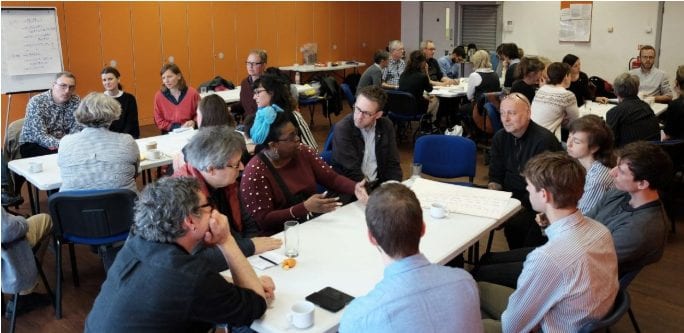Authored by Lianna Etkind, London CLT
London CLT, and the 23 genuinely affordable homes built at St Clements, wouldn’t exist if it wasn’t for the power of community organising.
Community organising is a methodology for making social change based on organised people, relationships and a pragmatic and strategic approach to power. Community organising has its roots in the US, but here in London, Citizens UK has championed organising based in membership institutions like schools, churches and mosques. Community organising is based on deep listening to understand the most urgent issues people face; developing leaders to participate skillfully in public life, and holding politicians to account. It’s democracy in action.

An Olympic Legacy
London CLT emerged from Citizens UK’s campaign for an Olympic Legacy – a legacy of affordable homes and decent jobs that would benefit ordinary East Londoners after the last athlete had packed up their trainers and returned home. Leaders from East London wanted to see London’s first Community Land Trust, with homes based on the incomes of local people, rather than an Alice-in-Wonderland definition of ‘affordable’. The decision in 2007 to formally constitute as a Community Land Trust came out of hundreds of conversations where people talked about the pain of seeing friends and family having to leave the area they called home. They talked about the shame of having to bring up a family in a damp, overcrowded flat, because that’s the only accommodation affordable on their salary in inner London.
Every day people have conversations about their frustrations a housing system where market forces trump peoples’ right to go back to a decent home at the end of a working day. Usually, these conversations happen a long way away from the people with the power to change things.
Campaigns rooted in our experience
An important part of community organising – and of our culture at London CLT – is testimony. London CLT is now working with groups in several boroughs, including Lewisham, Lambeth, Shadwell and Redbridge. At every single one of those sites, a key part of winning the support of the council has been local people directly affected by the housing crisis telling their story publicly and asking an elected politician for support. I will never forget a Housing Assembly organised by Lambeth Citizens where a young woman from the youth organisation The Advocacy Academy stood up at the front of a church hall and explained to Cllr Peck, then leader of Lambeth Council, what it was like to get her period when she shared a bedroom with her two younger siblings. This is the reality of how the shortage of affordable housing affects Londoners. There is huge power when we tell our stories publicly, rather than just being case studies in a report.
But testimony changes nothing unless there is power behind it.

Organised money, organised power
Community organisers often talk about organised people and organised money as two forms of power. In London, the power of organised money is clear to see. It’s there in the gated communities where units lie empty, bought as an investment rather than a home. It’s there in the shiny new towers where homes are priced far beyond what the police officer outside can afford, let alone the cleaner mopping the marble floor.
Organised power looks like 400 people filling a school hall, 800 eyes looking up at the Mayor as Nano, a leader from Lewisham Citizens, asks him whether he’ll help us find land for the borough’s first CLT. In Community Organising, a key part of winning commitments and land from politicians is turnout. It is tribute to the hard work of Lewisham Citizens in filling the hall – the phone calls, the announcement made at the end of the service, the item in the school newsletter – that so many people had turned out as we asked Mayor Bullock for his support. He said yes!
A legacy of leaders
Community organising has been an effective way to secure land, but we work hard with Citizens’ organisers to ensure that each campaign also develops leaders, whether that’s a member chairing their first meeting, or honing their negotiation skills through meetings with councillors. Our aim is that each of our developments leaves a legacy not just beautiful and affordable homes, but also of powerful leaders, who know how to make change happen.
Could your CLT benefit from community organising training?
Apply for our new Cohesive Communities Fund (deadline: Wednesday 14 August 2019) to get trained in this area and other movement building tactics. For more information on the fund, contact us.
